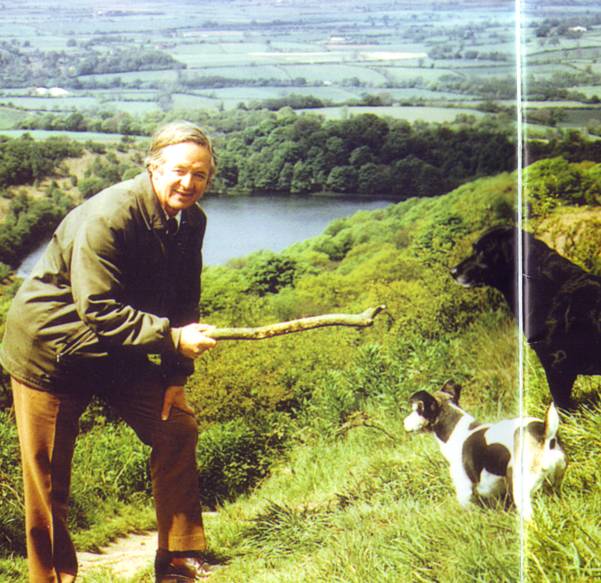By Jonathon Van Maren
In Anthony Esolen’s recent book Out of the Ashes, he mourns the passing—and heralds the return—of a time when communities existed—real communities, where the baker came outside each morning and helped children across the street for school even though no one had ever asked him to, when people trusted each other, knew each other, and time didn’t have anyone by the throat. As I was reading it, the world he described—and the traditionalism being increasingly championed by writers and intellectuals who are beginning the process of rethinking the technologically-driven and frantic lives modernity has bestowed on us—reminded me of a world I’d spent much time in, between the two covers of the magnificent books written by James Herriot.
James Herriot, of course, was the pen-name of Alf Wight, a British vet and author of such books as All Creatures Great and Small, All Things Wise and Wonderful, All Things Bright and Beautiful, and others. His books are alive with gruff farmers, aging and decaying upper crust sophisticates, animals with more personality than people, crisp morning air, and crackling fire places with hearths hot to the touch. Those Wight touched with his pen came alive, and the life he describes is the sort of life traditionalists are urging a return to.
A year ago, I interviewed James Herriot’s son, James Wight. Wight is now the author of his own book, James Herriot: A Memoir of my Father. His voice sounds just the way I’d imagined Herriot’s voice sounding and to be sure, I went rummaging about on the Internet for some old interview footage with James Herriot. The voices were nearly identical. Wight was also a vet, and worked for years with his father—he features prominently in some of Herriot’s later books. He also agrees that Herriot’s work preserves a world that is now past, but one that he too misses very much.
Those of you who have never read James Herriot’s books may find some of the following interview somewhat confusing. Or perhaps it will trigger your interest in his work—it certainly should. Discovering the world of James Herriot will be an event you will never regret.
JVM: What made you decide to write a book about your father?
JW: I was talked into it by my father’s agents. It was not my idea at all. I can claim no credit for that. And then I thought to myself, Well I can’t write a book because the last time I wrote anything was many years ago, at school. But then eventually I thought, Well, maybe this isn’t a bad idea, and other people were writing biographies about James Herriot and I realized they could be wide of the mark. And I thought, Well I know all about the man. I was close to him, I worked with him. I have all the facts at my fingertips. And I did some research and that was it. Basically, I immersed myself in it for two years and did the thing.
JVM: What are some of the main misconceptions that people have from other biographies such as Graham Lord’s book James Herriot: The Life of a Country Vet, about James Herriot? When you talked about the real James Herriot, what sort of misconceptions were you hoping people would avoid by reading your book?
JW: One of the misconceptions was that [Donald] Sinclair [Siegfried Farnon in the books] was a tyrant and my father was a wimp. Because my father worked harder than Sinclair did, that is absolutely true. He did work a lot harder than Donald. But you know, I’ve always thought there’s always two sides to every story and if you look closely at the agreement between the two men, yeah, my father worked harder. He did. And he supported Donald in many ways but he also earned more than Donald. He said to Donald, “Look, I’m doing all the work. Everything that I do goes into my pocket and everything you do goes into yours.” That’s fair enough, isn’t it?
And so there’s another side to all these stories which I managed, hopefully, to put into my book and to correct some misconceptions. The other big thing was that my fathers’, being a writer of fiction, a lot of his stories were what they described as apocryphal stories and jokes and things and they were all based on fact. So I had to put that one right as well.
JVM: It’s interesting when you bring up Donald Sinclair because Siegfried Farnon is one of the most captivating characters in the Herriot books and I think it’s because he’s rendered so well – his long sanctimonious pauses when he’s about to critique James Herriot for something, for example. And there’s a lot of stories about how Donald Sinclair, purportedly, didn’t like the books very much whereas his brother Brian Sinclair, or Tristan, loved the books. How much truth is there to that?
JW: That’s absolutely true. Brian Sinclair was probably one of my father’s two best friends of all time. My father and Brian were very close. My dad was also very close to Donald as well. Donald was one of the most unpredictable, the most difficult, but one of the most likable and honest men I’ve ever known. He could be terribly awkward and difficult, but when you think of the enigma of the man–he said to my father [when the first book came out], “This book is a test of our friendship.” But with the next breath you read that when All Creatures Great and Small was being filmed Donald threw parties for the film crew and the cast out of his own pocket up at his house. That’s the sort of amazing man that he was. He was totally unpredictable.
JVM: It wasn’t an unsympathetic rendering at all, in the James Herriot books.
JW: Oh no! I think that he portrayed Donald as Siegfried extremely well. And I was appalled when Donald disapproved of his character. If I’d been displayed as Donald was as Siegfried, I would’ve been very proud of it. He’s a pivotal character in the Herriot books apart from Herriot himself.
JVM: I would say that next to James Herriot, he’s usually people’s most favourite character.
JW: He is! The way he and his brother interacted, between the two of them, I think Tristan and Siegfried, to me they rank with some of the great comedy duos of all time. The love-hate relationship between the two brothers is just utterly fantastic. I think my dad was really kind to Donald in many ways. He didn’t dwell on some of the more difficult aspects of Donald’s character, which I have actually written in my book anyway–that he wouldn’t have any partners in the practice to take the pressure off my dad, which was a difficult thing. There were one or two difficult things. Sometimes he could be mean; sometimes he could be extremely generous.
And of course the other thing that my father never mentioned was that my dad did most of the work. That wasn’t mentioned either in the books. But again my father earned more money, so the thing was fair. Sinclair married money; he didn’t need to work too much. My father never received a thing in his life. He needed the money when he was a young vet, and he was prepared to work for it. And with Donald Sinclair, with Siegfried, he had a partner who he knew, despite all his idiosyncrasies and faults, would never stab him in the back.
He was very loyal to my dad. When you think about it, they never had to write two signatures on a cheque because they knew–each one knew that the other one was a straight guy. So I think that’s important.
JVM: What are some of your memories of Donald Sinclair aka Siegfried Farnnon?
JW: My memories I have with Donald are totally hilarious. Chaos–I think that’s the word that I would use. The man could be a genius with some things that he did. Other times he was utterly and totally chaotic. Some of the stories I’ve got about him, I’ve mentioned one or two in my book anyway, but if I sat down and thought about them all I could probably write half another book about the antics of Donald Sinclair. He’s such a funny guy.
JVM: How about Brian, or Tristan? How accurately was he rendered in the books? Because as you say, I think one of the reasons people are often suspicious of some of the James Herriot stories is they seem too funny to be true. They seem to have almost happened for someone to write them down.
JW: No, they were very, very accurate. Brian was accurately portrayed. A young man who was a delightful young fellow, but his whole aim in life was to work as little as possible and have as good a time as possible. And I think he achieved this throughout most of his life. Of course one of the reasons Donald disapproved of his portrayal was, he said to my father, “Look, you’ve portrayed me as shouting and bawling and screaming at my young brother all the time.” And my dad said, “Yes, well you were!” And of course Donald didn’t deny it. You must remember that Donald was a character because he didn’t think that he was. That’s why he was such a character. So, when he was reading about himself, in this first book of my dad’s, he didn’t think he was like that.
And of course he had good reason to shout at his brother because every time the young man failed his exams, which he did often when he was at veterinary school, Donald had to pay and Donald didn’t have money in those days. It was costing him money. His young brother cost him a lot of money. So there was always that love-hate relationship between the two, very well portrayed in that first book.
JVM: There was one other character that I have always been curious about because he’s so larger than life – it would be Granville Bennet – how accurate was he?
JW: He’s wonderfully portrayed–a big man with a big personality, an overpowering personality almost; one of my dad’s closest friends as well. And he was the great small animal vet living only about twenty miles away where the practice used to send all the difficult cases with the dogs and cats; a true bon viveur; huge, big drinker and socializer. He wasn’t a womanizer at all but he loved the good life. I saw practice with him when I was a student and he could be carousing into the early hours of the morning but he was always dead on time for his surgeries the next morning, immaculately dressed in a suit, not a pinstripe out of place.
He was a larger than life character, tremendous bon viveur. When I saw practice with him, I only survived for five days, the pace of drink was so huge I came home and I was diagnosed with alcohol poisoning, after only five days with Granville Bennet. Denton Pette was his real name. I got a second wind and went back again but what a generous man, tremendously generous and a brilliant surgeon.
JVM: One of the reasons that the books are so popular is because, of course, the veterinary experience is a very specific one in a lot of ways but the stories that your father writes takes so many twists and turns that they often capture the high drama of ordinary living, in some ways capture a snapshot of the culture of Thirsk, one that no one else was writing about. What did the people, the farmers, all the many characters displayed in those books, what did they think? Because he was writing these books while still dealing with them as clients.
JW: You know my father was very worried that these clients would recognize themselves. I told him at the time, I said, “I don’t know why you’re worrying too much because you’ve portrayed them all as pretty decent sort of people.” There was some miserable people like the Sidlows and people like these, but these were made up composites because some of the farmers were miserable. But most of them were excellent men and women, excellent characters. It was very, very well portrayed. He was very worried that they’d recognize themselves.
In fact, he used to put them off the scent by…he’d sometimes talk about, for instance, a lady called Mrs. Bush who had pigs; he called her Mr. Wally. He changed the sex around to try to put them off. But the only complaint he ever had was from a farmer, an elderly gentleman, a lame man with a stick, who came in and I thought he was going to attack my dad in the surgery one afternoon. He was [angry] because he hadn’t been included in the book, so I think my dad got it the wrong way around.
JVM: These books are culturally valuable from that perspective, aren’t they?
JW: Oh yes. I’ve always said there’s lots of vets who have written books, lots of doctors and lawyers, all sorts have written books. But the thing about Herriot’s books, to me, not only are they extremely well written but he writes about others and not just himself. And they’re about people, they’re about human nature. They’re not just about a vet treating animals. They go far, far deeper than that. And I think that he’s caught people’s imagination that way. I think this is one of the main reasons that they’ve been such a massive success.
JVM: I would agree with that. Of course, I’m in Canada and myself and most of my family members have read them. I grew up seeing them on the shelf for precisely the reasons that you say. When they came out in England what was the impact of the success of those books on your family? Because, you know, he was writing these wildly popular books; at the same time he was still working as a vet in the same town, in the same surgery, with the same partner. How did that go?
JW: Well of course there’s not a lot to say about that, Jonathan, because one thing about my dad was the fame never changed him. He didn’t change his way of life. He was never a greedy man. When you consider all the greed that goes on in the world today, my father as a young man and as a family man was in stark difference to this. He never wanted a huge amount of money. In fact, up until 1976 he was under a regime that was charging 83% tax. He refused to go abroad and avoid this tax illegally. He just decided he was going to pay it and he did.
JVM: Why did you follow him into the veterinarian business? Was it because of all the experiences you had with him growing up, many of which are actually in the books?
JW: I enjoyed going around with him. I went round with him from the age of three and so did my sister at a very young age as well. She wanted to be a vet too. I reckoned by the time I was five I was pretty well fully qualified. I’d seen it all. I was an experienced veterinarian at five. I never wanted to be anything else. I think one of the reasons it’s a credit to my father is because he was a good vet. He was a compassionate, fair, and caring vet and I observed all this for many years. I never thought of anything but being a vet.
JVM: When you read your father’s books, how many of those stories do you recognize? Because in your book you kind of let the readers in on some of the stories and say this was a composite story, this is how this actually went. How many of those stories did you actually recognize, when you were reading them, almost immediately?
JW: Oh, a lot of them, a huge number. I knew that my father had made some of the stories up as composites, of several different incidents that happened on different farms and put them into one. But I recognize all the incidents. In fact, I would say 80% of the incidents I recognize and 80% of the characters I knew who they were, the real live characters. In fact, his descriptive powers were so good to me, one of the commonest things I get asked is why did he set his books in the Yorkshire dales which is about thirty miles from here when his only work happened in Thirsk? The reason was because he wanted to retain his anonymity. He didn’t want anybody to know that he’d written a book.
And of course that backfired on him because he was a better writer than he thought. When the first book came out I was sworn to secrecy, I never said a word but the book came out and a guy came up to me in the Thirsk market place and he said, “Hey there’s a vet who’s written a book and I’ve read it. It’s very good but it’s your dad isn’t it?” And I said, “What makes you say that?” And he said, “Well he’s described old Thompson up on the golf course there absolutely perfect.” [Laughs.]
So, his powers of description were so vivid and of course he described Siegfried, Donald Sinclair, to a tee. Everybody knew immediately, who had read this book, that my dad was the author. So it was out. The cat was out of the bag.
JVM: How long did it take people to figure it out?
JW: [Laughs.] I think it was probably days. It was pretty fast. But, they never said much about it. That was what my dad liked–nobody said anything.
JVM: This I have to ask you because you actually worked with your father but of all the different James Herriot stories (and everyone has one that sort of sticks out in their head); the one that always stuck out in my head is the eternal war he had with this one particular farm gate that would “buffet him high and low” every time he got near it. I don’t know why that sticks in my head. It just does and others that I talk to, and I have quite a few friends who read the James Herriot books, they all have this one description or story that sticks out in their head as well. What is yours?
JW: Well that’s one for a start because it’s so different to nowadays where we don’t have farms with gates now. There were farmers called Annesleys, and there were seven gates to open and close and seven gates to come back. That was fourteen gates, fourteen times to get out of your car. The other thing that used to put me into convulsions was his experience trying to get a semen sample from a bull and the bull eventually turned around and attacked him and he fought it off with his artificial vagina that he had. He beat it over the snout with the artificial vagina and of course he got the semen sample in a little test tube but it flew up into the straw.
But of all the books he’s written the best story, and my sister agrees with me and my wife, is in the first one which is the antics of Siegfried, James Herriot and Tristan in the old house. I like those stories best of all.
JVM: From your perspective, because obviously these books are a family history, the history of your father, but to a large degree too they’re also a history of your profession; you just mentioned they don’t have farmer’s gates anymore. To what extent do the Herriot books capture a time that’s passed now? Obviously you’ve worked as a vet your whole life, and there have been a lot of changes.
JW: Tremendous! This is why they still sell–they’re describing the way of life of the farmer, the doctor, the vet, that’s almost disappeared. When you think of our practice here where I started in the mid-1960s, we used to have about ninety small farms, all milking cows. Now we have two farms milking cows. So from ninety down to two. Dogs and cats in those days were a sideline and sometimes you’d be on a farm and have a look at a dog but not much and they’d have it for free, on the house. And now, people are paying a fortune to go to a veterinarian to have their dog treated. I’m so grateful that he’s preserved that way of life for us all to look back nostalgically and enjoy.
JVM: What do you miss the most from those days?
JW: I think I miss the sort of friendliness of the community. Don’t get me wrong, the community’s still friendly, but in my work traveling to multiple family farms where a vet was almost a member of the family, stopping at farms, having tea and cakes and homemade stuff from the farmer’s wife; to me, it was almost like a holiday with pay at times. It was terrific.
There’s one funny thing that happened once. I didn’t write it in my book, but the local postman was a young man called Peter New, and he arrived at a farm at the same time as my dad to post some letters so my dad said, “There’s two gates to open, Peter, so I’ll take this letter because I’m going up to see a sheep.” And Peter said, “Oh no, Mr. Wight, I’m sorry you can’t do that. It’s against regulations. If anything happened to the letters…”
“Come on, Peter, I’ve known you since you were knee-high. I’ll take it.”
“Oh no, Mr. Wight.”
“Fair enough.”
So the two of them went up to the farm and Peter delivered his post. When my dad had finished lambing the sheep he came out and the postman was still there. So he went in to wash his hands in the kitchen and there’s the postman getting into bacon and eggs and black sausage and tomatoes and everything. So my father just went up to him and said “Hey, so it’s the rules and regulations, eh Peter? My ass.” That’s what the farms were like! They were a pleasure to visit.
The other thing I do look back on, compared to modern day practice, is that life was that little bit slower than it is today. Everybody’s going at breakneck speed and there’s more stress. I think the veterinary profession is under far more stress. They’re responsible to a far more demanding public now than they ever were. You know, this business about litigation and suing, my father never had this sort of thing–not so many rules and regulations, not so much paperwork. His job was a bit more fun than I think it is today.
A comment from a reader: My vet in Norcia [Italy] is German, and he told me he decided to become a vet after reading Herriot. He said he just knew instantly that this was exactly the kind of life he wanted. And so he studied, and took a job as a country general practitioner in Norcia. Married a local girl, also a vet, and mostly doesn’t charge the old ladies to look after their cats. When my Winnie was reaching the end, he made all sorts of housecalls, and kept her going right to the end. A book like that can change a life.









Very interesting interview. Warm, informative and reassuring.
These books are some of my favorite books of all time and I have read them several times and watched the old BBC series many times. I am watching it again now in these troubled times. Yorkshire is also one of my favorite parts of the world and we often visited and stayed in Thirsk on our way to visit family in “The Borders”. We had the privilege of meeting Alf Wight in the late 70’s at the surgery in Thirsk and he was just as his son has described him – warm, open, and welcoming. I will never forget the encounter and I enjoyed this interview immensely!
I have loved the books all my life and watched all the TV episodes. And here I am 70 yes old watch
Ing all over again while looking up facts on the internet as I go along, so I have learned so much more. The best thing is reading and watching during Covid 19 because All Creatures takes me completely away to simpler times and a bucolic life. I completly lose the stress of my chaotic life. I am very grateful that J. Harriet and his son chose to share their lives and stories with the world.
I too loved the books and am enjoying the re-run of the old BBC series (again!). It wasn’t a perfect world and there was a lot of hardship – but how much better than the world we live in today. No political correctness, no wokery – just warmth and simple living with a real feeling of community. How I wish we could return to that way of life.
Political correctness is called politeness and wokery is being a decent unjudgemental human being. I’m hopeful Alfred Wight would have been both of those things…..
Right now it means letting a 52 year-old sex offender whip out his penis in front of underage girls in a spa changing room because he claims to be a trans woman, and to call anyone that objects a transphobic bigot. That seems neither decent nor non-judgemental.
No Dr. Being woke means being an easily swayed idiot.
The two commenters who have already replied to you have it right. Political correctness is not the same as being polite. You can be polite and still have opinions, and express those opinions, that may differ from yours, on issues like sexuality, immigration, etc. The same applies to your contention that ‘wokery’ just means being decent and ‘unjudgemental’. Your definition of what is ‘decent’ may not be the same as another person’s definition. And when you say that one shouldn’t be judgmental, what you likely mean is that people don’t have the right to criticize, and, yes, ‘judge’, actions or attitudes they find objectionable. But people do have a right to voice opinions, even when (or, perhaps, especially when) those opinions are critical of the left’s social orthodoxy.
Dr. Dawson, your view is one that held sway for a couple of decades, until perhaps the last 5 years. But people who have felt silenced by people who told them they could not judge, are no longer remaining silent. And a tide is turning, Dr. Dawson. Open and free discussion of important issues is happening again.
I learned of “the James Herriot books” from my mother (of Mr. Herriot’s/Wight’s generation) in the mid-’70s, eventually buying all 4 (US editions). In the nearly 50 years since, I’ve read them and Mr. Herriot’s/Wight’s first “Yorkshire” book multiple times. I’ve also read his son’s book…and needless to say tremendously enjoyed each reading…at multiple levels – now enhanced by the internet.
Thank you for posting this interview of Mr. Herriot’s/Wight’s son. It’s genuinely uplifting to come across examples of goodness inherent to so many unsung ostensible strangers throughout our life’s journey…and it’s good to have reason to believe Mr. Herriot/Wight’s family is carrying it across generations.
Love his books!! I have them all! Especially love to read before I go to sleep. A getaway from today’s world. A better time and people as far as I am concerned. He was born around the same time period as my grandad who was born in 1917. They don’t make very many men like that anymore! Thank you for posting. Was very interesting.
I have read-re-read and enjoyed these books since they were published-They are a wonderful escape from the issues we face today—a simpler time–These books show us friendship-dedication-honesty-humor-love. The stories never get old–I also enjoy the series from BBC-
I was a children’s librarian,.Read all the Herriot books and read some to my students. I have a great nephew and his wife who are vets in West Virginia. I just love the PBS Masterpiece series and all the stories about the production . I was brought up on a farm and my father loved animals. I once asked him why he was so committed to his animals and he answered by saying God had given him the responsibility. Truly another generation. . Thank you for all the interviews.